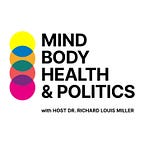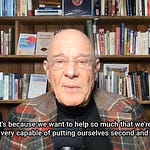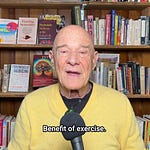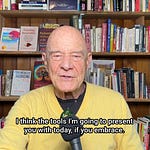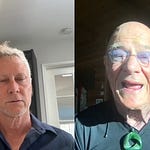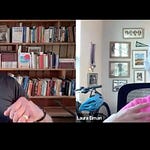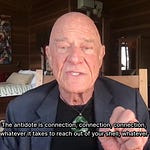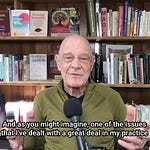Dear Listener,
I’m thrilled to share my recent interview with Susanne G. Seiler, a Swiss psychedelic editor, journalist, writer and activist who has had a considerable influence on the renascent psychedelic movement. Since 2017, she has been the editor of gaiamedia goodnews, the monthly bilingual newsletter published by the Gaia Media Foundation in Basel.
In our conversation, Susanne dives into the underground persistence of psychedelic therapy in Switzerland, highlighting how the country maintained these practices even during the ban. She shares insights into the forgotten women leaders in psychedelic science, shedding light on their crucial contributions that have often been overlooked. Susanne also discusses her interdisciplinary salons, which foster human connection across divides and serve as a model for building community.
One key takeaway from our conversation is the importance of unity and love in psychedelic experiences. Susanne emphasizes how these substances can connect us to a sense of oneness and tap into the power of love, which are fundamental to both personal happiness and societal progress.
Susanne's passion for reviving psychedelic therapy, amplifying the voices of women pioneers, and cultivating community shines through in our discussion. I'm confident that her wisdom and experiences will inspire and enlighten you.
Please tune in to our conversation and subscribe for more engaging discussions at the intersection of science, spirit, and society.
Golden light,
Dr. Richard Louis Miller
Links and Resources
Be Here Now by Ram Dass
LSD: My Problem Child by Albert Hoffman
Show Notes
Welcoming Remarks and Discussion on Direct Democracy and Voting Rights (0:11-6:55)
Why direct democracy with frequent voting on local issues is more empowering and engaged than occasional national elections
How voting by mail from home works in Switzerland
The benefits of Switzerland's inclusive and welcoming attitude toward immigrants
Addressing Addiction and Homelessness Through Compassion Rather Than Criminalization (6:55-14:28)
Why Switzerland treats addiction as a health issue rather than a criminal issue
How the Swiss heroin program provides controlled doses and housing to improve lives
How the program relieved constant pressure to find drugs and reduced street homelessness
Why criminalization worsens problems and a health approach is more cost-effective
How the program reduced heroin's appeal and shifted focus to emerging cocaine problem
Psychedelic Therapy's Long History and Continued Progress in Switzerland (14:28-26:17)
How a psychedelic therapy group kept the practice alive through the ban with government exemptions
How Switzerland balances safety with access by requiring case-by-case approval
How low psycholytic doses open patients up, while high psychedelic doses catalyze inner journeys
Why LSD's lack of appeal in youth helps avoid recreational problems
How psychedelics connect us to oneness and love which are key to happiness and progress
The Overlooked History of Women in Psychedelic Science (26:17-38:22)
How Susanne came to find and interview the first woman to take LSD in 1943
Why women like Anita Hofmann were equal pioneers but overlooked
How psychedelics were originally overseen by women in goddess cults
Why including men is vital, since rigid feminism harms equality too
Building Community through Psychedelic Salons (38:22-47:36)
How the pandemic prompted new online and in-person salons
How Cabaret Voltaire’s arts and music provide an intimate, engaging setting
How attendees connect through art and ideas, not necessarily shared views
How the groups provide a model for bridging divides through humanity
Reflections on Core Teachings and Looking Ahead (47:36-1:00:00)
Why oneness and connection are key realizations from psychedelics
How love and giving bring meaning more than status or possessions
Why believing in people's goodness fosters progress and healing
How one book can open new worlds of insight and community
Goals for upcoming books on psychedelic history and women.
Seeking Psychedelic Testimonials: The Good, the Bad, and the Ugly.
We are currently looking for first-hand accounts of adverse effects of psychedelics—from ‘bad trips,’ to unwanted physiological complications, to abusive practices by guides, therapists, and shamans.
The interviews from this series will go into a forthcoming book on the topic—perhaps the first book its kind.
Please contact me if you would like to be interviewed. You can also leave us a voice message to share your story. We will keep your information anonymous unless you tell us otherwise.
NOTE: The podcast is always freely available thanks to our paid subscribers. Please share this post to show your support for transparency. The following transcript distills the key points from this show into a condensed form. It is meant as a reference - listen to the full episode for an accurate rendition of the conversation.
Transcript
Welcoming Remarks and Discussion on Direct Democracy and Voting Rights (0:11-6:55)
Dr. Richard Miller: 0:11
Welcome to Mind, Body Health and Politics. I'm your host, Dr. Richard Louis Miller. The mission of Mind, Body Health and Politics is to enhance your physical and emotional well-being and encourage community. I say encourage community because I believe that living in community is the most effective and healthiest way for us human beings to live. We like doing things together. We are basically cooperative, collaborative animals. We like doing all kinds of things together, whether it's book clubs, sewing clubs, golf clubs, bowling clubs, all kinds of things. We like inventing things together, we like writing things together. We love eating together, we just love sitting around in small groups, and eating food together. That's who we are. That's who we've always been going way back to the caves. We are tribal animals. And when we know everyone in the community, by face or at least by name, we just love being together.
However, we must also be extremely aware of the fact that a very small percentage of us are extremely different. These people are predators. These people who when we came out of the caves, had the biggest club. These people then went on to be tribal chieftains. They went on to create little towns and cities, and they were the ones who quote, ruled us. Eventually, these people formed larger territories that became kingdoms. And they gave themselves the name kings. And when they were kings, they didn't have citizens, they had subjects, and they subjected everybody under them, to their very whims.
And this group has been with us right from the beginning, as well of as all of us who are friendly collaborators. Go back to the Egyptian times when the pharaohs ruled 99% of the population. Fast forward into history. The Greeks and the Romans tried democracy and Republic, but they were eventually overthrown. You'll remember Caesar crossed the Rubicon and changed the Republic into an empire. Move forward into history. And you'll see other examples of these dominator predators, be they Napoleon, or early 20th century Mussolini, Hitler; 21st century now Bolsonaro, Trump, these are people who would have us be subjects again, and not citizens.
We must be alert and aware and vote at all times, we must establish our right to vote and continue to vote so that we live as a free people, not as subjects under rulers. In the words of one of my great heroes, Thomas Jefferson, "Eternal vigilance is the price of liberty."
Addressing Addiction and Homelessness Through Compassion Rather Than Criminalization (6:55-14:28)
Dr. Richard Miller: 4:05
Today on Mind, Body Health and Politics, I'm pleased to have with us Susanne Seiler, who's coming to us all the way from Zurich, Switzerland. Good morning, Susan.
Susanne G. Seiler: 4:17
Hi, Richard. It's afternoon here, actually, late afternoon.
Dr. Richard Miller: 4:21
Good afternoon, citizen. So you told me right before we started, that you had a list of things that you wanted to talk about. Were you able to find your list?
Susanne G. Seiler: 4:33
I have my list. But it's kind of changed a little because now, after what I hear you say, I'd like to talk a little bit about direct democracy, which is what we have in Switzerland, where we vote all the time. We don't just vote to get a president or not, we vote whether we're going to build a new school, or whether the price of milk should go up. We vote over all kinds of things, minor things, major things. I vote about six times a year, seven times a year like that. So I agree with you voting is very important and there should be more of it where you live.
Dr. Richard Miller: 4:55
Yes, there should be a lot more of it. What method do you use for identification? Are you using fingerprints or iris prints?
Susanne G. Seiler: 5:05
No, no, no, no, no, we are here in Europe, everybody is registered. When you live somewhere you are registered at the registration office. So when I vote, the material comes to me, I seldom go to the voting office, I prefer to vote by mail. So I get an envelope, I open it up, I take out the material, I sign a card, I put the card back so that my address is now the sender. And I send it in, you can also go and vote in person. But everybody here who is registered and above 18 years old has the right to vote, we don't have to go and register every time. We registered once and for all. So the voting material comes home to us.
And it comes together with booklets, there are three kinds of votes, we have city votes, cantonal votes and federal votes. And we vote sometimes just on all three levels, sometimes just on one or two levels. It depends. So the material is sent home to us together with the explanation. It will say do you want to give a budget credit of $275 million? We want to build this new school. The people who are for it are saying this and this, the people who are against it are saying this and this. And we recommend this and this. And then you choose.


